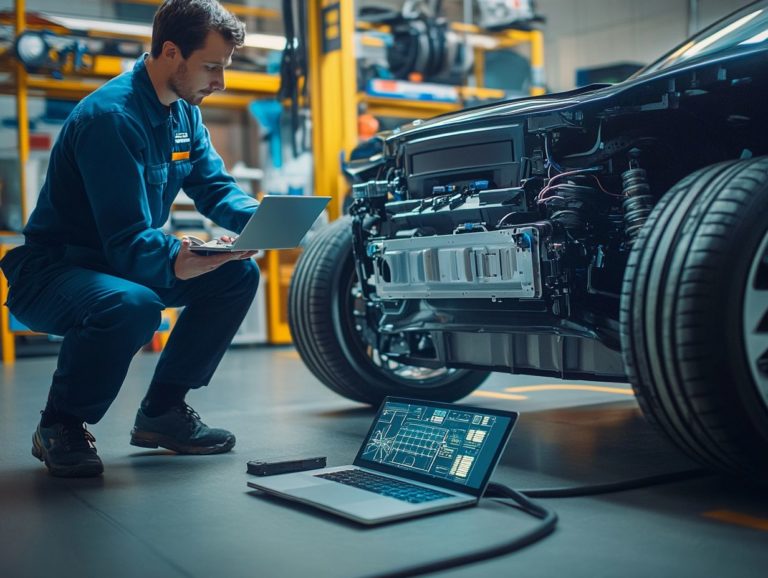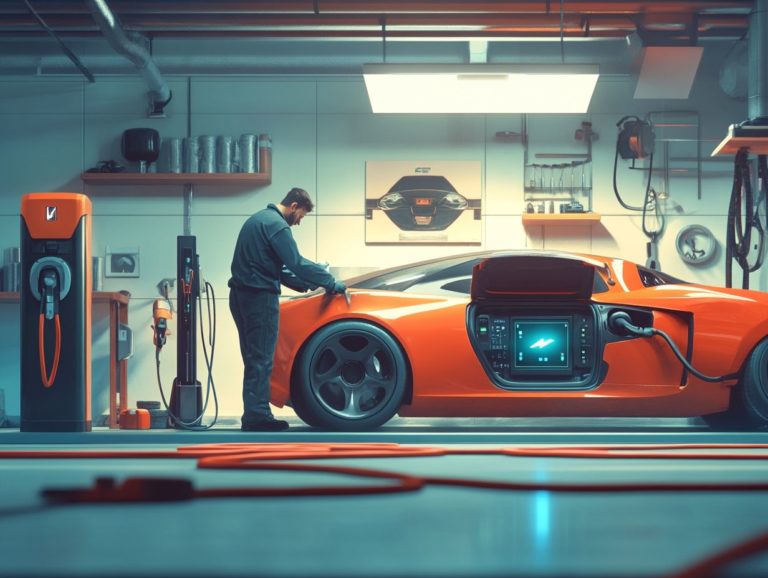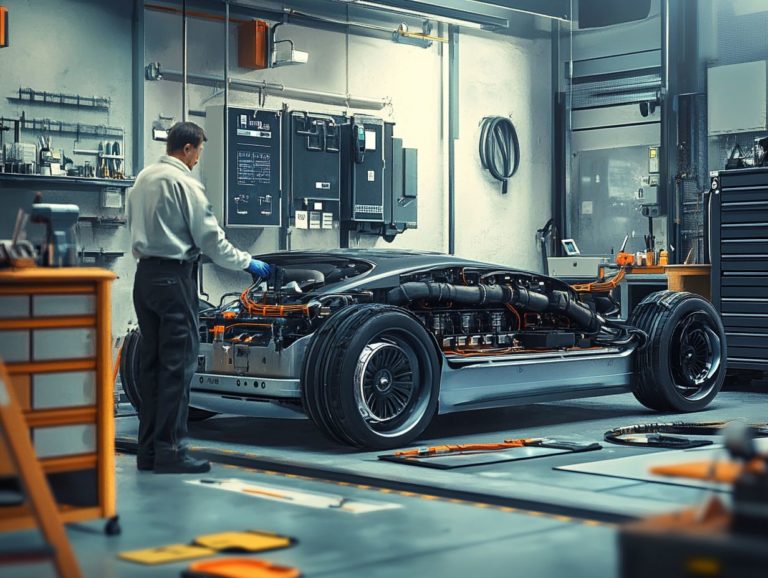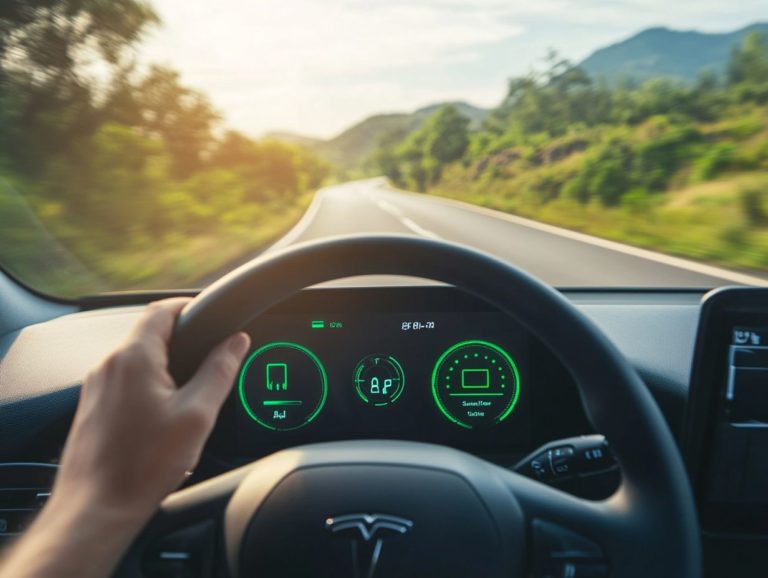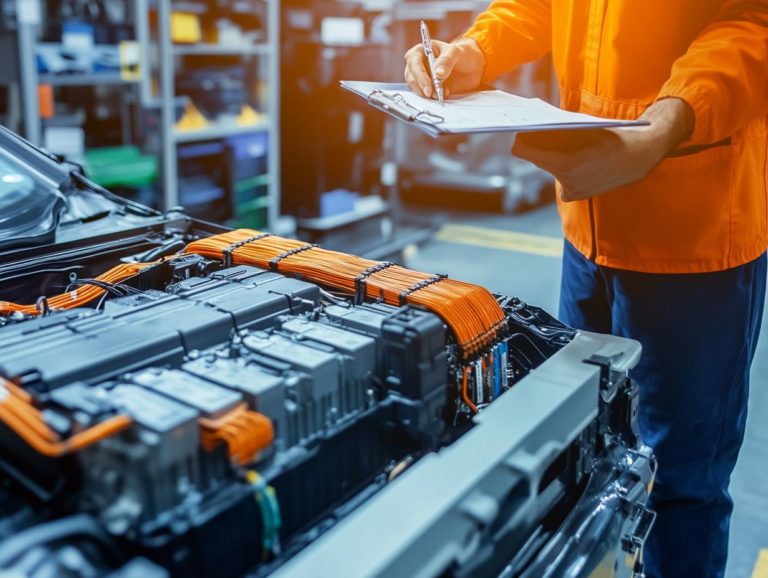Understanding EV Regulations and Maintenance
Electric vehicles (EVs) are transforming the transportation landscape. They provide a cleaner and more sustainable alternative to conventional gasoline-powered cars.
This article delves into the essentials of EVs. We will explore their operational mechanics and the government incentives that are driving their adoption.
Get ready to dive in and discover everything you need to know about EVs! You ll also discover essential maintenance tips that will help you get the most out of your electric vehicle.
Contents
Key Takeaways:
- Know the basics of EVs, including how they function and their pros and cons, so you can make an informed choice.
- Stay updated on government incentives and maintenance tips to keep your EV running smoothly.
- To extend your EV’s lifespan, follow longevity tips and stay on top of routine maintenance tasks.
What are EVs and How Do They Work?
Electric vehicles (EVs) mark a transformative leap in the automotive landscape. They offer a compelling alternative to traditional internal combustion engines.
These vehicles use advanced technology, featuring electric motors and battery packs that enable efficient, eco-friendly transportation.
The electric motor transforms electrical energy from the battery packs into mechanical energy. This offers a smooth and responsive driving experience.
Thanks to battery technology particularly lightweight lithium-ion batteries you benefit from a high energy storage system designed to deliver impressive power on demand.
Regenerative braking systems recycle energy during braking to recharge the battery, enhancing overall efficiency. As you explore options like the Ford Mustang Mach-E and Hyundai Kona Electric, you’ll appreciate the expanding network of charging stations supporting this groundbreaking technology.
Regulations and Incentives for EVs
Government policies and programs are instrumental in advancing the adoption of electric vehicles (EVs). They provide a range of incentives and regulations that work to reduce carbon emissions and encourage electric mobility.
You must explore these initiatives to save on your EV purchase! They include tax credits, rebates, and the development of infrastructure to support charging stations.
Government Policies and Programs
Government policies surrounding electric vehicles (EVs) are rich with incentives tailored to promote eco-friendly transportation and encourage consumer adoption. Tax credits and rebates make purchasing EVs financially appealing.
Many countries have rolled out programs that include grants for charging infrastructure, access to carpool lanes, and reduced registration fees. These initiatives make the transition to electric vehicles both enticing and practical for consumers.
Take Norway, for example; its aggressive incentive strategies have resulted in a remarkable surge in EV market share. Meanwhile, various states in the U.S. offer direct cash rebates to further enhance the appeal of going electric.
The overarching aim of these initiatives is to forge a comprehensive ecosystem that supports EV adoption. This ultimately paves the way for a sustainable future marked by reduced carbon emissions.
Benefits and Drawbacks of EVs
Electric vehicles (EVs) offer numerous benefits, including lower maintenance costs and a reduced environmental footprint. However, they also present challenges, such as limited driving range and issues related to proper care of the battery and degradation.
One standout advantage of EVs is their ability to significantly reduce operating costs compared to traditional gasoline-powered cars. They generally require less frequent servicing and have fewer moving parts that can wear out over time.
As a potential owner, you might wonder about the limitations of driving range, especially during long road trips, as many models still don t quite match the range of gas cars. Effective battery management is very important to maximize lifespan and efficiency, adding a layer of complexity that might catch you off guard.
Understanding these aspects is crucial for anyone considering a shift to an electric future.
EV Maintenance Basics
Grasping the fundamentals of EV maintenance is essential for ensuring the longevity of your vehicle. Understanding EV warranty and maintenance is crucial, as electric vehicles (EVs) operate differently from traditional internal combustion engine vehicles, requiring specialized maintenance tasks.
Keep your eyes on battery care, electric motors, and other vital components to ensure your EV runs smoothly.
Routine Maintenance Tasks
Routine maintenance tasks for electric vehicles (EVs) include essential practices like tire maintenance, brake checks, and timely software updates. These practices play a vital role in ensuring optimal vehicle performance and safety.
By staying diligent about these tasks, you can enjoy a smoother driving experience and extend the lifespan of your vehicle. For example, proper tire maintenance is crucial for maximizing efficiency and improving energy consumption.
Regular brake inspections are equally important, especially in adverse conditions, to ensure your safety on the road. Keeping your software up to date optimizes the battery management system and may even unlock features that enhance your driving convenience.
Neglecting these aspects can lead to diminished performance, increased wear and tear, and potential safety hazards. Prioritize your vehicle’s upkeep!
Special Considerations for EVs
When it comes to electric vehicle (EV) maintenance, pay special attention to battery care and degradation, and remember to check the maintenance needs of EVs regularly to avoid unnecessary wear and tear.
Your EV relies on the special batteries used in EVs, which require consistent monitoring for optimal performance and longevity. Over time, factors like temperature fluctuations and your charging habits can reduce battery capacity, making regular assessments essential.
The cooling systems in your EV are crucial for regulating battery temperature, vital for efficient operation. Neglecting these components can lead to overheating or freezing, both of which can severely impact performance. Understanding these maintenance needs can significantly extend the life cycle of your electric vehicle.
Extending the Life of Your EV
To extend the life of your electric vehicle (EV), engage in diligent care through effective maintenance routines. This approach not only ensures optimal performance but also enhances the longevity of critical components, such as battery packs and electric drivetrains.
Take action now to ensure your EV runs like new for years!
Tips and Tricks for Longevity
To ensure the longevity of your electric vehicle (EV), it’s essential to adopt effective maintenance practices. This includes proper battery care and checking your vehicle often to proactively address any potential issues. Additionally, staying informed about environmental regulations for EVs can also help you maintain compliance and enhance your vehicle’s performance.
Focusing on battery health is crucial. Keeping the charge levels between 20% and 80% can significantly extend the battery’s life.
Regular checks should cover not only the battery’s condition but also tire pressure and brake systems. This ensures that every component operates at peak performance.
Establishing a routine for checking fluids, filters, and overall vehicle performance allows you to catch minor issues before they escalate. This ultimately saves you from costly repairs.
Staying informed about software upgrades and manufacturer recommendations enhances your EV’s performance and safety on the road. This leads to a more satisfying and reliable ownership experience.
Frequently Asked Questions
- What are EV regulations and why are they important to understand?
- Understanding these regulations is crucial because they impact the availability, affordability, and accessibility of EVs.
- What are some common EV regulations that consumers should be aware of?
- Common EV regulations include incentives and rebates for purchasing an EV, emissions standards for vehicle manufacturers, and requirements for charging infrastructure.
- How do EV regulations differ from traditional vehicle regulations?
- EV regulations focus more on promoting clean energy adoption and reducing carbon emissions, rather than solely on safety and fuel efficiency like traditional vehicle regulations.
- How can I stay up-to-date on EV regulations and changes in my area?
- Stay ahead of the game by regularly checking your local government’s website or contacting your state’s Department of Motor Vehicles for updates on EV regulations. Following industry news and joining online communities of EV enthusiasts can also help.
- What maintenance is required for an EV?
- EVs typically require less maintenance than traditional vehicles due to fewer moving parts. However, regular tire rotations, brake inspections, and battery checks are recommended.
- Are there any special regulations or requirements for owning an EV?
- Some areas may have specific regulations for EV owners, like designated charging stations or parking spaces. Researching and complying with these regulations is essential to avoid penalties or fines.

